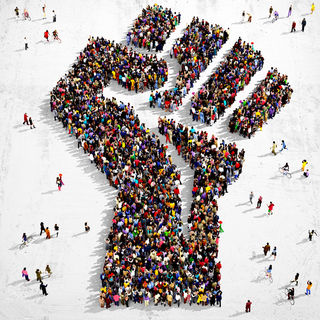
Why do we fight? The reasons are both simple and complicated. We’re wired to defend territory and self-protect. Our minds make quick judgments. Pride is a force. When challenged, we fill in the blanks quickly and put our stake in the ground and become trapped in toxic cycles that keep us from progressing.
When U2 lead singer Bono was invited to George W. Bush’s White House in 2005, it turned heads. They were an unlikely pair, with ideological differences that weren’t exactly a secret. Bush had gotten wind of Bono’s concert criticisms, but instead of firing back, he requested a face to face to see if common ground could be found.
Their eventual alliance led to a collaboration that helped millions of people affected by the AIDS crisis in Africa. It also provides a powerful example for us to see beyond our gripes with those situated in different ideological, geographic and social identity spaces.
The toxic bickering that seems to be a mainstay in our world is leading to a level of eruption and polarization that’s getting in the way of us finding potential synergies. Our constant state of being riled up and triggered by the loudest extremes being presented to us in the media is keeping us from finding ways to build bridges instead of walls.
Here are some starters to help redirect the energy we spend bickering, finger pointing and marinating in toxic energy.
1. Come out of your corner and redefine “neighbor”.
Society tries to force us to think narrowly. Limited options are presented that encourage us to check off binary boxes and fit precisely within the bounds of ideological sides, affinity groups, social identities, and so-called “norms” determined by our families, communities of origin, generational context, and prescribed social categories. As activist IO Tillet Wright put it: “Familiarity is the gateway drug to empathy”. If we only associate with those that look like, think like, or agree with us, we end up having limited hospitality—the kind that makes us assert kindness and regard for those we narrowly define as "neighbors". These kinds of “in” and “out” groupings prevent us from forging rich, dynamic connections that bring about better outcomes for everyone.
2. Adopt a curiosity mindset.
One of the best ways to reduce the tendency to “other” and disarm stereotypes, bias, fears and prejudices is to be willing to embrace a “What can I learn from you mindset?” Practice active listening and asking questions, rather than asserting your opinion or trying to prove your own point. Be willing to unlearn what you’ve been taught about particular groups or positions. Unleash your enthusiasm to relearn and become more expansive as a conscious global citizen—rather than falling for the five second sound bite about the so-called “other” that doesn’t begin to tell the full story of human spectrum.

3. Look for shared values.
Instead of fighting with each other, fight against the urge to assume there’s nothing to connect over. Often there’s so much more than we’re conditioned to first realize. The Golden Rule is generally agreed upon in theory, but hard when the rubber meets the road. Fear clouds judgment, and we end up shouting instead of listening and searching for common ground. We cling to our own constructions of “natural” and “normal”. That if you’re in X category based on race, class, gender, sexual orientation, age, ability, religion, or otherwise, then you must be Y. Suspension of these judgments can give us the needed space to find shared values that move us from a place of territory to solidarity, where we can actually learn, grow and work together instead of succumbing to the limited, toxic options being presented.
The reasons we fight are complicated, but coming out of corners, redefining "neighbor", adopting a curiosity mindset and looking for shared values can help us begin to move from a place of self-protection to connection. As author Tom Shadyac put it "Cooperation will become the marching orders of the human species or we're not going to make it".
References
Shadyac, T. (2014). Life’s Operating Manual: With the Fear and Truth Dialogues. Carlsbad: Hay House.
Associated press (2005). Today.com website, http://www.today.com/id/9755936/ns/today-today_entertainment/t/bono-vis….


